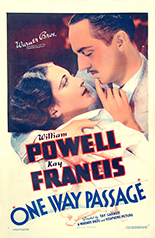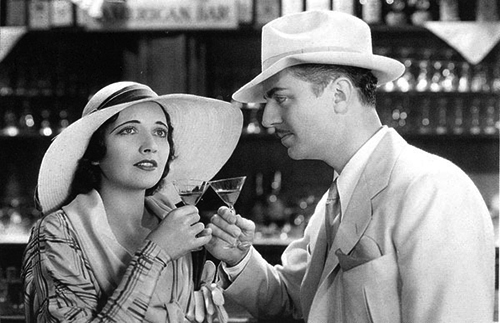
 One Way Passage’s Dan Hardesty and Joan Ames take the concept of star-crossed lovers up a few notches. These moribund lovebirds could have met on a dating site run by the Grim Reaper. But being that this gem is from Warner Bros. in 1932, there is no dating site, but rather a Singapore bar for the couple’s meet-cute.
One Way Passage’s Dan Hardesty and Joan Ames take the concept of star-crossed lovers up a few notches. These moribund lovebirds could have met on a dating site run by the Grim Reaper. But being that this gem is from Warner Bros. in 1932, there is no dating site, but rather a Singapore bar for the couple’s meet-cute.
Played by William Powell and Kay Francis (their fifth on-screen pairing), Dan and Joan fall for one another almost instantly. As fate would have it, they soon find themselves aboard the same ocean liner steaming from Hong Kong to San Francisco. The operative word here is “fate.” Dan is in the custody of a tenacious but dimwitted cop (Warren Hymer) and on his way to the San Quentin penitentiary to be hanged for murder – a perfectly justifiable homicide, mind you, but the law is the law, even in pre-Code Hollywood.
Joan is facing her own mortality issues. She suffers from one of those nebulous movie maladies where, as her doctor helpfully explains, just a shock to the system could kill the poor girl. On the high seas, however, Dan and Joan are determined to hide the tragic truth from one another, choosing instead to dance, drink cocktails and pitch woo.
Can love forestall fate? The inordinately dapper prisoner-to-be (it’s William Powell, after all) manages to elude his escort with the help of two longtime pals who are also making the trans-Pacific trip. That pair prove to be the comic ace up the movie’s proverbial sleeve. Alice MacMahan shines as a streetwise con woman masquerading as a countess, while Frank McHugh crushes his every scene as a drunken pickpocket.
To borrow a colloquialism from its era, One Way Passage is a honey of a picture. Director Tay Garnett would go on to have a more auspicious career shooting for TV in the 1950s, but his work here is altogether respectable. The camerawork is surprisingly fluid for its time, with nifty tracking and dolly shots. The pace is brisk, the laughs are genuine, and the script, by Wilson Mizner and Joseph Jackson, even serves up an emotionally resonant ending, all within a 67-minute running time. That’s always a trip worth taking. —Phil Bacharach

